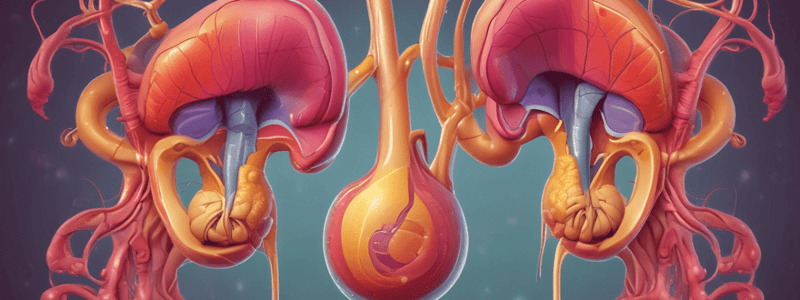Podcast
Questions and Answers
What is the primary function of the tubular reabsorption process in the nephron?
What is the primary function of the tubular reabsorption process in the nephron?
- To prevent the loss of essential nutrients and molecules from the body (correct)
- To filter out waste products and toxins from the blood
- To regulate the concentration of substances in the blood
- To produce urine with a high osmotic pressure
Which part of the nephron is primarily responsible for the tubular reabsorption process?
Which part of the nephron is primarily responsible for the tubular reabsorption process?
- Proximal convoluted tubule (correct)
- Collecting duct
- Loop of Henle
- Glomerulus
Which of the following substances is actively reabsorbed in the proximal convoluted tubule?
Which of the following substances is actively reabsorbed in the proximal convoluted tubule?
- Creatinine
- Uric acid
- Urea
- Glucose (correct)
What is the primary driving force behind the tubular reabsorption process?
What is the primary driving force behind the tubular reabsorption process?
Which of the following hormones plays a role in regulating tubular reabsorption in the nephron?
Which of the following hormones plays a role in regulating tubular reabsorption in the nephron?
Flashcards are hidden until you start studying
Study Notes
Urinary System Physiology
- Urine formation involves a complex process with multiple stages
- The process of urine formation is primarily divided into three main stages: filtration, reabsorption, and secretion
Filtration
- Filtration is the first stage of urine formation, occurring in the renal corpuscle
- In this stage, the blood pressure forces water, ions, and small molecules out of the bloodstream and into the renal tubules
- The renal corpuscle is composed of a glomerulus and a Bowman's capsule
Reabsorption
- Reabsorption is the second stage of urine formation, occurring in the proximal convoluted tubule (PCT)
- In this stage, the majority of the water, ions, and nutrients are reabsorbed back into the bloodstream
- The PCT is highly permeable, allowing for the reabsorption of these essential components
Secretion
- Secretion is the third stage of urine formation, occurring in the distal convoluted tubule (DCT) and the collecting duct
- In this stage, the remaining waste products and excess ions are secreted into the tubules
- The DCT and collecting duct are less permeable, allowing for the fine-tuning of electrolyte balance and pH regulation
Studying That Suits You
Use AI to generate personalized quizzes and flashcards to suit your learning preferences.




